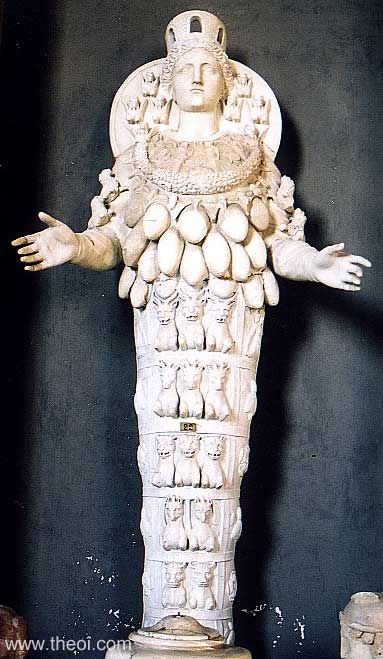Looking at the statue of the Ephesian Artemis reminds me of when I lived in Japan, as the slender statue looks more like a Shinto deity than a Greek goddess. In fact, if you were to compare the idols of the Greek gods with the statue of Artemis which came from Ephesus, you'd probably think you were looking at completely different religious icons. And, in a way, you'd be right.

Artemis is unique among the Greek deities because she never married or had 'relations' with the other gods. She preferred the hunt to a dinner party, and the human lovers who were lucky enough to win her affection always met with tragic death, sometimes at her hand. She was the goddess of the moon, but the forest and childbirth were also within her realm of protection. Hunters would often lay the skins and horns of their prey upon a tree branch before leaving the woods as an offering so that Artemis wouldn't hunt them down for killing the animals before she had the chance. Women would cry out to her during childbirth in hope of relief from their pain either by the child emerging or receiving a quick death. The Greeks of Peloponnessus, that's the European side of ancient Greece, far preferred Zeus or Ares as their important deities, but for the Ephesians, none other than Artemis would do.
The Artemis image from Ephesus sticks out like a sore thumb in the Pantheon of Greek gods, and that is because that image predates Greek settlement in Asia Minor. It seems that before the Greek colonists came, the Ionian natives had built a matriarchal culture around a fertility goddess whose name has been erased by the fog of time. When the Greeks came and conquered the place, they adopted the image and claimed that it was Artemis, since the Greeks were fond of syncretism (that means incorporating local deities into your religion – word of the day!).
The Greek culture was extremely patriarchal, especially in Athens. Though it is true that Spartan women could own land and personal property (something Athenian women had no right to), this was done mostly out of necessity since the Spartans practiced open marriage. Thus it became necessary for the Greek priests to first break down the matriarchal local religion before they could alter the culture as well. Since the ancient worldview was typically that reality reflected the divine realm, those Ionians who were conquered must have figured that their religion was backwards, and so gave in to the priests and renamed their statue.
Her unique appearance, combined with the need for ancient people to have a lot of children to hedge their bet, made her a popular deity, and her temple in Ephesus was three times larger than the Parthenon temple that the Athenians built for their patron god Athena. In fact, the Ephesian Temple of Artemis was one of the seven wonders of the Ancient world, making Ephesus a huge tourist attraction for people from every corner of the Mediterranean and Black Sea. Ephesus being a coastal town, its economy was dependent on trade and tourism, so much so that there was once a riot against Christian missionaries organized by idol craftsmen who feared the sag in their income that a more popular god would bring! You can read more about this uprising in Acts chapter 19, which is a very informative account of the fame of the Ephesian Artemis.

The cult surrounding Artemis, ironically, centered around her virginity. Priests who served this moon goddess would willingly castrate themselves while men who went off to war would swear vows of chastity before the idols and likely keep a pocket-sized version with them as a reminder. While encamped in rugged hills on campaign, I imagine many a veteran Hoplite telling a tale around a cookfire all about a foolish young soldier who broke his vow to Artemis and brought his entire army to ruin. There were many such tales, since the Greeks were so fond of Fables.
Though Artemis was widely beloved, she eventually fell to the cross, as did all her Olympian brethren. Over time, the Roman Empire became more and more Christian through either proselytizing or by political manipulation, and the old gods were cast aside like yesterday's newspaper. Artemis would hunt no more.
Pax vobiscum


No comments:
Post a Comment